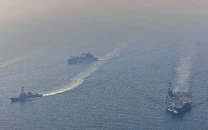'The Quad is here to stay': Leaders pledge to strengthen 'Indo-Pacific security'
Biden hosts leaders of Australia, India, and Japan at his private residence to discuss regional challenges and China.
1726987456-0/BeFunk_§_-(34)1726987456-0-640x480.webp)
US President Joe Biden hosted the leaders of Australia, India, and Japan at his private residence in Delaware for a Quad summit focused on Indo-Pacific security.
The leaders—Prime Ministers Anthony Albanese of Australia, Narendra Modi of India, and Fumio Kishida of Japan—joined Biden in discussing key regional challenges, including China’s growing assertiveness.
In remarks overheard by the press, Biden stating that while Chinese President Xi Jinping may appear to be addressing domestic economic issues, his administration’s aggressive tactics in the Indo-Pacific region persist.
Biden specifically noted China’s actions in the South China Sea, East China Sea, South Asia, and the Taiwan Strait, stating that these behaviors span both diplomatic and economic spheres.
Publicly, Biden was more succinct, reaffirming the commitment of the four democracies:
"The Quad is here to stay."
This sentiment was echoed in a joint statement by the leaders, outlining their shared vision for peace and stability in the Indo-Pacific.
Although the statement only directly mentioned China three times, it strongly condemned any destabilising actions that alter the regional status quo through force or coercion.
The Quad members also voiced concerns over missile launches in the region that violate UN Security Council resolutions and called for greater maritime security.
A key outcome of the summit was the announcement of new initiatives to strengthen regional maritime security, including sharing advanced maritime technologies with Indo-Pacific nations and launching cooperative efforts between coast guards.
During the Quad Leaders Summit in Wilmington on Saturday, US President Joe Biden and Japanese Prime Minister Fumio Kishida discussed diplomatic relations with China and expressed mutual concerns about "coercive and destabilizing activities" in the South China Sea, according to the White House.
Both leaders reaffirmed their commitment to maintaining peace in the Taiwan Strait and advancing cooperation on critical technologies such as artificial intelligence and semiconductors.
A joint mission by the Quad’s coast guards, planned for 2025, aims to address illegal fishing—an area where Chinese vessels have been identified as major violators.
While the Quad’s discussions on China were more muted in official statements, experts have noted that Beijing’s growing influence looms large in the group's deliberations.
Rafiq Dossani, an Asia scholar, observed that while the leaders are cautious about antagonizing China publicly, the strategic competition with Beijing is a key driver of Quad cooperation.



















COMMENTS
Comments are moderated and generally will be posted if they are on-topic and not abusive.
For more information, please see our Comments FAQ